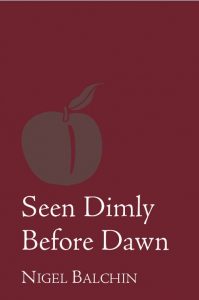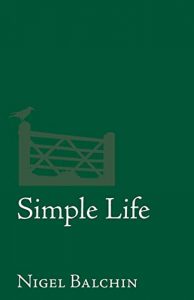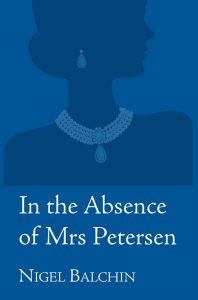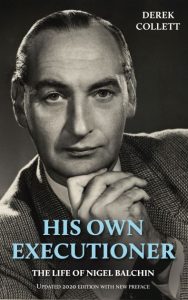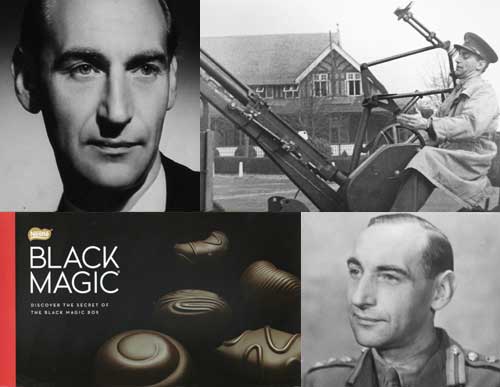How Can I Buy the Books in the Nigel Balchin Collection?
Thanks for asking! There are several ways to do this:
1. If you want to buy the Kindle versions of any of the books for £3.99 then you can get them from Amazon. Click the link below to buy the Kindle version of Seen Dimly Before Dawn.
Seen Dimly Before Dawn eBook : Balchin, Nigel, Collett, Derek: Amazon.co.uk: Kindle Store
2. If you want to buy a paperback version of any of the books for £9.99 then these are also available from Amazon. Click the link below to buy the paperback version of Sundry Creditors.
3. If you want to buy a paperback version of any of the books but don’t wish to deal with Amazon then you can go into any bookshop in the UK and place an order with them. If they look puzzled then tell them they can order it from the wholesalers, Gardners.
4. If you want to buy paperback versions of Seen Dimly Before Dawn or In the Absence of Mrs Petersen then you can get them (while stocks last) at a knockdown price from the curator of the series, Derek Collett. See advert below for details.
Special Offer!
While stocks last, you can take advantage of a special offer and obtain copies of both Seen Dimly Before Dawn and In the Absence of Mrs Petersen for the bargain price of £16, or £8 for either book, which includes free postage and packing (offer valid for UK customers only). These two example of Balchin’s late work show the master novelist close to the peak of his considerable powers, whilst also showcasing very different facets of his unique gifts as a storyteller. I only have very small stocks of both books left so please act quickly to avoid disappointment! Please email me via the contact form on this website to place your order.
The Latest Reissued Novel
Felix Milne is a London psychoanalyst. When the novel opens he is close to splitting up with his wife, Patricia. One of the main reasons for this is that Milne is keenly interested in beginning an affair with Patricia’s best friend, Barbara. In the first few chapters, Balchin brilliantly sketches in the daily round of a 1940s British psychotherapist. Milne’s patients range from a young boy who wets his bed to Lady Maresfield, a bored middle-aged woman who fears that her husband no longer loves her. The tone of the novel darkens when Adam Lucian is persuaded to see Milne by his wife, Molly. Lucian is a former Spitfire pilot who was shot down over Burma and subsequently captured and tortured by the Japanese. After escaping from a prison camp, Lucian was picked up by the British and shipped back to England. Reunited with Molly, all goes well for a while until Lucian makes two attempts to kill her: first by strangulation and then when he tries to push her under a train on a crowded Underground platform. Milne assesses Lucian, forms the impression that he is ‘markedly schizoid’ and warns Molly not to be alone with him, an instruction that of course she duly ignores. Thus the twin tracks of the narrative—Milne’s pursuit of Barbara and Lucian’s murderous designs on Molly—are set in motion and aligned on their inevitable collision course.
Mine Own Executioner is a key Balchin work. It cemented his reputation as one of the best British novelists to emerge from the war, following as it did hard on the heels of Darkness Falls from the Air and The Small Back Room. When it was first published in the autumn of 1945, it received excellent reviews, with writers of the quality of John Betjeman, Monica Dickens, L. P. Hartley, Pamela Hansford Johnson and Elizabeth Bowen vying with each other to offer the most fulsome praise. More recently, Philippa Gregory has described Mine Own Executioner as ‘the most extraordinary exploration of the human condition’.
With the exception of one very obscure reissue, Mine Own Executioner has been unavailable to buy since the 1960s. The current republication of the novel by Penhaligon Press therefore represents a landmark event. The 2023 version of Mine Own Executioner published as part of the Nigel Balchin Collection contains all the usual features—an introduction, extensive and helpful notes, a bibliography and a biographical sketch of Balchin—as well as a useful glossary of psychiatric terms and a piece about the film version of the novel.
Mine Own Executioner is now available to purchase from Amazon in both paperback and ebook versions, priced at £9.99 and £3.99, respectively. You can also buy it from other online book retailers such as Blackwell’s or by placing an order with a UK bookshop (just ask them to order it from the wholesalers, Gardners).
Also Available…
The 2020 revised and updated version of my acclaimed biography of Balchin, His Own Executioner: The Life of Nigel Balchin, is still available to purchase. Please click on the ‘Biography’ tab in the menu at the top of the page for details of how to buy a copy.
Nigel Balchin at a Glance
Trained originally as an industrial psychologist, in which capacity he helped Rowntree’s to successfully launch Black Magic chocolates in 1933, Nigel Balchin first received critical acclaim as a novelist during the Second World War when he wrote Darkness Falls From the Air. It was the first of three evocative novels (including the smash-hit The Small Back Room) that made good use of his wartime employment experiences at the Ministry of Food and later in the army. This trio was followed by a stream of other fine novels, such as A Sort of Traitors, Sundry Creditors and The Fall of the Sparrow. Balchin diversified into film scriptwriting after the war, winning a BAFTA for his work on The Man Who Never Was and penning what he whimsically described as “the first folio edition of Cleopatra”, being his original (unused) script for the Richard Burton/Elizabeth Taylor epic. When Balchin died in 1970, at the age of 61, an obituarist in the Guardian anointed him “the novelist of men at work”, a fitting epithet for one of the best fiction writers of the twentieth century. As recently as 2016, Clive James observed that “if a whole era’s most unjustly neglected literary tendency [i.e. novels set in a place of work] is to be revived and properly estimated, Balchin is undoubtedly the place to start.”
The first biography of Balchin (His Own Executioner: The Life of Nigel Balchin) was published in 2015, with a revised and updated second edition following in 2020. Click here for information about the book.
